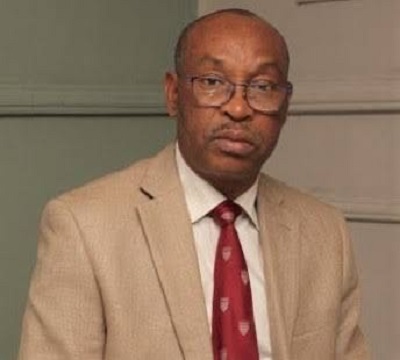Dr. Orji Ogbonnaya Orji, Executive Secretary of NEITI
The Nigeria Extractive Industries Transparency Initiative (NEITI) has called on policymakers to ensure a harmonized, transparent, and predictable regulatory framework for Nigeria’s solid minerals sector, to sustain growth and attract long-term capital investments.
NEITI’s findings show significant improvements in the licensing process but call for equal priority to address policy overlaps and multiple taxation, which continue to discourage credible investors and limit sectoral growth.
The Executive Secretary of NEITI, Dr. Orji Ogbonnaya Orji, made the appeal at the 2025 Nigeria Mining Week held in Abuja.
According to Dr. Orji, “Nigeria’s mining sector stands at a defining moment, undergoing far-reaching reforms aimed at repositioning it from a largely informal and underperforming space into a cornerstone of our economic diversification and energy transition strategy.”
Citing NEITI’s 2023 Solid Minerals Industry Report, Dr. Orji noted that the sector’s contribution to GDP remains below 1%, even though revenues grew modestly from ₦339.57 billion in 2022 to ₦401.87 billion in 2023.
He emphasized that despite this growth, the figures are far below the sector’s full potential. “Our data further reveal that artisanal and small-scale mining accounted for over 80% of total production volumes but contributed less than 30% of royalties paid. This underscores deep governance and structural challenges that demand urgent reform,” he stated.
Dr. Orji commended the Federal Government for bold reforms already undertaken, particularly in the following areas:
- Revocation of dormant licenses and deployment of Mining Marshals to curb illegal mining.
- Launch of the Nigeria Mineral Resources Decision Support System (NMRDSS) to provide real-time geological and cadastral data.
- Integration of climate accountability and decarbonization measures into mining operations under the Energy Transition Plan.
- Proposed review of the Nigerian Minerals and Mining Act, 2007, to align with current realities.
According to Dr Orji, these steps mark a clear policy shift from discretion to data, and from opacity to transparency. “NEITI fully supports these reforms because transparency builds trust, and trust drives investment,” Dr. Orji emphasized.
On NEITI’s role in the ongoing reforms, he explained that “at NEITI, we have evolved from an audit agency to a reform institution. Through our annual independent industry reports, we reconcile company payments and government receipts, ensuring fiscal accountability across the extractive value chain.”
He further disclosed that NEITI has undertaken a national study on the Impact of Energy Transition on Nigeria’s Oil-Dependent Economy, and developed a Policy Brief on Just Energy Transition and Climate Accountability Framework, outlining how Nigeria can manage the shift to cleaner energy transparently, inclusively, and fairly.
Dr. Orji also called for strategic focus on developing critical minerals such as lithium, cobalt, and manganese to position Nigeria advantageously in the evolving global energy transition landscape.
He urged stakeholders in the mining community to support government efforts to establish a credible National Mineral Reserve Database accessible to investors and the public. He further recommended:
- Streamlining fiscal and royalty regimes to eliminate duplication.
- Promoting value addition and local processing to retain economic benefits.
- Strengthening environmental, gender, and community development frameworks in host communities.
- Pursuing comprehensive reforms that enhance indigenous participation, protect local jobs, and safeguard national interests.
In his remarks, President Bola Ahmed Tinubu, represented by the Secretary to the Government of the Federation, Senator George Akume, described the Nigeria Mining Week as “an emerging global forum generating ideas to guide the nation’s journey toward economic renewal through investor and company collaboration.”
The President emphasized Nigeria’s continental leadership role, stating “when our mining sector thrives, it signals that value-added resource development is Africa’s way forward.
This event has made Abuja a hub for continental dialogue on responsible mining, forging a shared vision for Africa to benefit more fully from its natural wealth.”
He noted that Africa holds about 30% of the world’s known mineral reserves and significant deposits of the critical minerals driving the 21st-century global economy. “We must harness this wealth responsibly, ensuring that more value remains within our economies, creating jobs and industrial clusters,” the President urged.
President Tinubu further remarked; “Nigeria has no reason to be poor, given our abundant resources and talented people. Our challenge is to harness these potentials to bring prosperity to all. Let us turn our minerals into miracles of development ‘Minerals to Miracles’ must be our rallying cry.”
He assured that the Federal Government remains committed to ensuring that mining areas across Nigeria are safe for all stakeholders, including investors, workers, and host communities.
Earlier, the Honourable Minister of Solid Minerals Development, Mr. Oladele Alake, presented a status report on reforms initiated by the present administration to transform the mining sector and reposition it as a driver of economic growth.
On the sidelines of the Mining Week, Dr. Orji Ogbonnaya Orji also addressed a special mining forum organized by the Kaduna Mining Development Company, where he underscored the importance of transparency and accountability in repositioning the company for greater productivity, investor confidence, and sustainable impact.
In a detailed presentation, Dr. Orji outlined how subnational mining companies can play a strategic role in driving institutional reforms and attracting investment into state economies.


Comment here